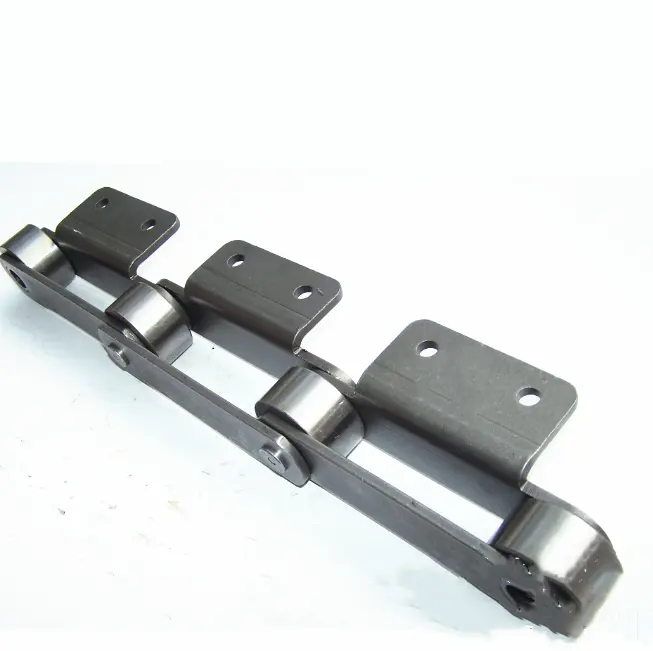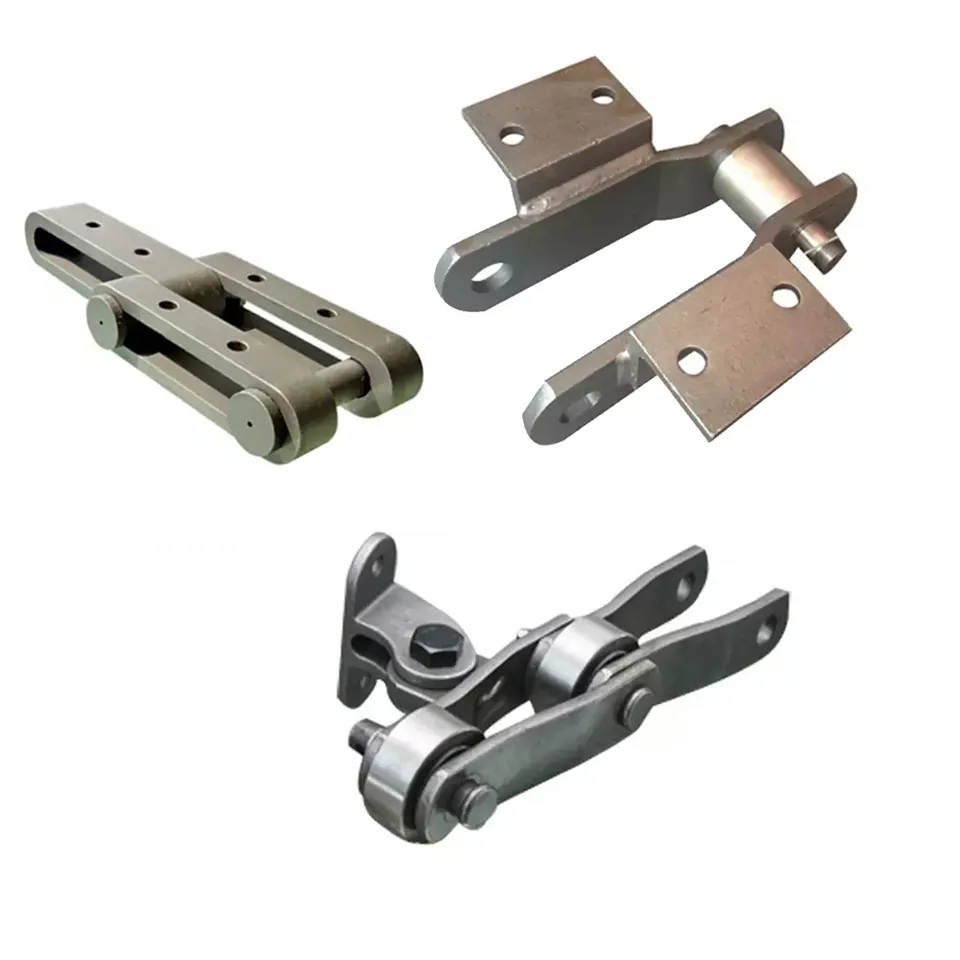Product Description
Steel Welded Mill Chain (WH132)
Supply offset sidebar welded steel chain,straight sidebar welded steel chain:
WR78,WH78,
WR82,WH82,
WR124,WH124,
WR111,WH111,
WR106,WH106,
WR132,WH132,
WR150,WH150,
WR155,WH155,
WR157,WH157,
WR159,WH159,
WR200,WH200
Pack Detail:
CHOOSE TAI
1.Tran-auto industries co.ltd was established in 2005.With “Customer first,quality first”
service concept, we had become 1 of the main export chain and transmission equipments in China. TAI at present mainly produce various specifications of standard and non-standard chains, such as transmission chain, conveyor chain, agricultural chain, motorcycle chain, stainless steel chain, also produce various specifications and materials of chain sprocket, pulley, timing pulley, taper bush and coupling.
2.TAI with sophisticated CNC equipment, advanced technology and perfect inspection equipment produce all kinds of chains, sprockets and other transmission equipments which can make the customers’ trust. The company since its establishment has passed ISO9001 and other certifications. “High quality, high benefit, high standards” to sing more integrated into the world. Adhering to the “good faith service to customers” purposes, from being in order to after-sales service ,each bit closely link, TAI will provide the most intimate, comprehensive service.
3.”Meet the customers’ requirement, until customers’ satisfaction” is our goal from start to finish, better innovation and better cooperation can create better TAI to service the world. Let us work together, to create a better future with each other.
Welcome contact for more details.
CHINAMFG Gao(Sales)
Tran-Auto Industries Co.,Limited
716 Gold River Center,NO.88 Shishan Rd.,
New District,HangZhou,P.R.China.P.C.:215011
tran-auto
| Chain No | Pitch
(mm) |
Outside Barrel Dia
(mm) |
Pin Dia
(mm) |
Side Bar Height
(mm) |
Approx Tooth Face at pitch line
(mm) |
Length of Bearing
(mm) |
Plate Thickness
(mm) |
Ultimate tensile strength
(KN) |
Weight Approx
(Kg/FT) |
| WH132 | 153.67 | 44.45 | 25.4 | 50.8 | 73 | 111 | 12.7 | 511 | 6.43 |
/* January 22, 2571 19:08:37 */!function(){function s(e,r){var a,o={};try{e&&e.split(“,”).forEach(function(e,t){e&&(a=e.match(/(.*?):(.*)$/))&&1
| Material: | Carbon Steel |
|---|---|
| Structure: | Welded Chain |
| Surface Treatment: | Polishing |
| Chain Size: | All |
| Feature: | Heat Resistant |
| Trade Style: | Trade/Manufacture/OEM |
| Customization: |
Available
| Customized Request |
|---|
How do mill chains handle material flow and transfer in bulk handling applications?
Mill chains are specifically designed to handle material flow and transfer in bulk handling applications with efficiency and reliability. These chains are widely used in various industries, such as agriculture, mining, construction, and more, where bulk materials need to be transported in large quantities. Here’s how mill chains achieve material flow and transfer:
1. Robust Construction: Mill chains are constructed using high-quality materials, such as alloy steel, which provides excellent strength and durability. Their robust design allows them to handle heavy loads and withstand the stresses of continuous material transfer.
2. Precise Alignment: The design of mill chains ensures precise alignment between the chain and sprockets. This alignment helps to maintain a smooth and consistent material flow, reducing the risk of jams or blockages in the system.
3. Flexibility: Mill chains are flexible enough to adapt to various conveyor configurations, including inclined or declined conveyors. This flexibility enables them to efficiently transport materials across different terrains and elevations.
4. Low Friction: Mill chains are designed to minimize friction during operation. This low friction characteristic reduces the energy consumption and wear on the chain, resulting in a longer service life and improved material transfer efficiency.
5. Adaptability: Mill chains are suitable for handling a wide range of bulk materials, including grains, aggregates, ores, coal, wood chips, and more. Their adaptability makes them a versatile choice for different industries.
6. Conveyor Systems: In bulk handling applications, mill chains are commonly used in conveyor systems. These systems utilize rotating sprockets to move the chain, and the material is carried along the conveyor’s path, ensuring a continuous flow of materials from one point to another.
7. Bucket Elevators: Mill chains are often employed in bucket elevators, which lift and transfer bulk materials vertically. The buckets attached to the chain scoop up the material and discharge it at the desired location, providing an efficient material handling solution.
Overall, mill chains are essential components in bulk handling applications, ensuring the smooth and consistent flow of materials in various industrial processes. Their reliable performance, strength, and adaptability make them a preferred choice for material transfer in many industries.
What are the safety considerations when using mill chains in industrial settings?
Safety is of utmost importance when using mill chains in industrial settings. Proper maintenance, installation, and operation are crucial to ensure the safe and efficient functioning of the equipment. Here are some key safety considerations:
1. Training and Education: Workers operating and maintaining the mill chains should receive proper training and education on equipment handling, safety protocols, and emergency procedures.
2. Personal Protective Equipment (PPE): Operators and maintenance personnel should wear appropriate PPE, such as safety gloves, safety goggles, and protective clothing, to prevent injuries during handling and maintenance.
3. Regular Inspections: Conduct routine inspections of the mill chains to identify any signs of wear, damage, or malfunction. Address any issues promptly to avoid potential accidents.
4. Lubrication: Proper and regular lubrication of the mill chain is essential to reduce friction and wear. However, ensure that lubricants used are compatible with the application and do not pose any health hazards.
5. Load Capacity: Do not exceed the recommended load capacity of the mill chain. Overloading can lead to premature failure and accidents.
6. Guarding: Install appropriate guards and safety devices to prevent accidental contact with moving parts of the mill chain and reduce the risk of entanglement.
7. Emergency Stop Devices: Equip the mill chain system with emergency stop devices that allow workers to quickly halt the operation in case of emergencies or potential hazards.
8. Handling Hazardous Materials: If the mill chain is used in handling hazardous materials, ensure that proper containment and safety measures are in place to prevent spills and exposures.
9. Environmental Considerations: Be mindful of the environmental impact of using mill chains. Follow proper waste disposal procedures and consider eco-friendly alternatives when applicable.
10. Compliance with Regulations: Ensure that the mill chains and associated equipment comply with relevant safety regulations and standards set by regulatory authorities.
By adhering to these safety considerations and maintaining a proactive safety culture, the risk of accidents and injuries in industrial settings can be significantly reduced, creating a safer and more productive work environment.
How do mill chains handle abrasive and harsh operating conditions?
Mill chains are designed to withstand abrasive and harsh operating conditions commonly found in various industrial applications. They are constructed using durable materials and specialized designs to ensure reliable performance in demanding environments. Here’s how mill chains handle such conditions:
1. Material Selection:
Mill chains are typically made from high-quality materials like alloy steel, which provides excellent strength and wear resistance. Some chains may also have specific coatings or surface treatments to enhance their durability.
2. Hardened Components:
To increase resistance to abrasion, the components of mill chains such as pins, bushings, and rollers are often hardened through heat treatment processes. This hardening ensures that the chain can endure repeated contact with abrasive materials without significant wear.
3. Specialized Design:
Mill chains may have special design features, such as extended pins or oversized rollers, to reduce contact pressure on the chain’s components. This design minimizes wear and prevents premature failure in abrasive environments.
4. Lubrication:
Proper lubrication is crucial for mill chains operating in harsh conditions. Lubricants reduce friction between moving parts, dissipate heat, and prevent abrasive particles from causing excessive wear.
5. Sealed Joints:
Some mill chains feature sealed joints or special protective covers to prevent abrasive materials from entering critical areas of the chain, further extending its service life.
6. Regular Maintenance:
Even with their robust design, mill chains still require regular maintenance. Scheduled inspections, cleaning, and lubrication help identify potential issues early and keep the chain operating optimally in abrasive and harsh conditions.
7. Proper Chain Tension:
Maintaining the correct chain tension is essential to avoid excessive wear. Proper tension ensures smooth operation and minimizes contact with abrasive materials.
Overall, mill chains’ ability to handle abrasive and harsh operating conditions is a result of their sturdy construction, appropriate material selection, and regular maintenance, making them reliable components in various industrial settings.
editor by CX 2024-04-13



